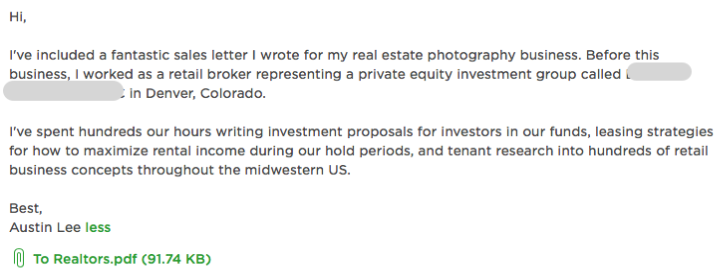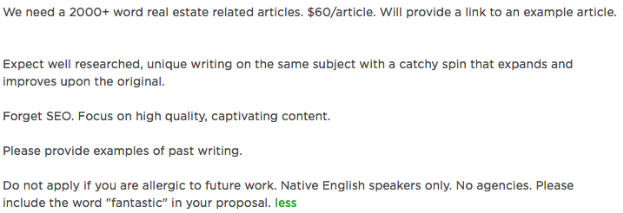This is a guest post by Austin Lee – who is going to show you how to become a freelance copywriter (and get clients, of course). Austin is a freelance copywriter who helps 6 and 7-figure businesses grow sales with engaging email autoresponders.
“Freelance copywriting – that sh*t doesn’t work, trust me.”
From the depths of my parents basement, terrified of returning to the whipping post of the corporate grind — my friend said these harsh words to me over Skype when I told him about how to get freelance clients.
He was talking about Upwork, the world’s largest online freelancer marketplace.
Apparently it’s a hell-pit where poor freelancers go to work for “slave lord” clients, who pay so little that you’re forced to survive on a diet of beans, rice, and ramen noodles.
But – it’s also where most newbie freelance copywriters get their start.
Thankfully, I trusted my gut and the research I’d done on this hotbed of freelancing opportunity … and decided to NOT to listen to my friend…
Or any of the other many unsolicited opinions of friends, parents, and somewhat well-intentioned people trying to steer me towards safer employment options.
(I mean … are there any “safe” employment options these days?)
Instead of failing to be a freelance copywriter, I learned:
- How to get freelance clients
- How to create a thriving, self-sustaining business (completely online and 100% remote)
- How to more than 3X my rates in under 6 months
And I’m going to show you exactly how I did it.
What’s more, you don’t need to quit your job to get started as a freelance copywriter.
So if you want to start getting freelance copywriting clients, but don’t know where to begin… you’re in the right place.
Maybe you’ve listened to these common, but completely untrue myths about being an Upwork freelancer:
- You must accept $3/hr to compete with people in India, Philippines, China etc.
- You need loads of experience and a thriving network in the industry
- You need a website, and an extensive, relevant portfolio of great copy to land clients
The truth is, these are ALL wrong.
Because once you understand WHAT people are looking for with Upwork (hint: it’s not “expert” copywriters) …
And once you know how to solve their problems…
You can start getting clients quickly, ignore the haters, and start making real money.
Now – I didn’t have any copywriting experience when I started on Upwork. However, I was a natural writer which helped (and had solid people skills), but I had never worked with a client before.
Honestly?
I was terrified.
But I pushed through my resistance, and landed my first client for $2,200 USD writing a drip-email sequence.
Note: There is no guarantee you’ll earn this on your first Upwork copywriting job (or any job for that matter) – but I just want to show you what is possible as a freelance copywriter.
When you want something enough, you’ll find a way to make it happen.
So – let’s get into it.
How To Become A Freelance Copywriter (and How To Get Freelance Clients ASAP)
Before getting my first client as a freelance copywriter, I spent months studying copywriting, starting a blog, and going balls to the wall in “education mode.”
I learned a TON about the craft, human psychology, and writing sales letters.
But I wasn’t creating anything valuable. And that’s where a lot of newbie Upwork copywriters go astray.
In fact, I remember reading a guest post on Tim Ferriss’s blog… and looking back, this advice sounds insane to me.
While I love Tim’s blog, this guest recommended slogging through 9 months of blogging to “build a reputation” and hopefully attract clients.
This sucked me into a black hole of wasted time — where I cranked out tons of work for no money, and wrote blog posts nobody read (it wasn’t so fun to be a freelance copywriter in this instance).
(These days – I’d be sure to do a ton of SEO research before writing a single blog post, so that I can make sure I’m writing content that people are actually searching for, and to increase my Google rankings and website traffic).
When you get down to the specifics of finding your first Upwork copywriting client, they won’t give a damn about the book review you wrote about The Ultimate Sales Letter, if you’ve never written a sales letter.
They want to know “can this guy or gal DO the job?”
“Can they solve MY problem?”
And if you can show that through your writing samples (which are similar to the client’s job post) and through your Upwork proposal – you’ll have a much higher chance of landing your first paid gig.
To learn how to sharpen your copywriting skills for 100X less than a year of college tuition, check out this killer post by John that helped me get started.
In this post, however, I will focus on delivering high quality results in a low-risk, learn-as-you-earn environment.
So how do you become a freelance copywriter without blogging your brains out of your ears?
How to Land Freelance Copywriting Jobs on Upwork – Without Prior Experience
I’ll show you the steps I followed to break into Upwork copywriting as a freelancer, without selling my time for pennies, and without building a website or printing a single business card.
You can use Upwork as a launch pad to get a taste of the action, see if you like it, and even keep your day job while you run your test experiments after your 9 to 5.
Even submitting proposals for one or two hours a day is enough to get paying clients within the first two weeks.
Remember, if you’ve ever written a high school essay, a letter to a friend, or a cover letter…
…you can become a freelance copywriter.
Everything you’ve ever written has prepared you for this moment. Don’t discount it.
If in doubt, write down a list of all the things you’ve written so far in your life. Successes. Awards. Achievements.
Every single email you’ve written to a co-worker.
If you’re reading this post, you’ve likely written thousands of words in your lifetime.
John, along with Ben Settle (email marketing boss), and many others — all agree you DON’T need to be a great “writer” to get good at writing copy (note from John: I dropped out of high school and skipped university, so you definitely DON’T need to be a great “writer” to become a paid freelance copywriter).
Now that we’ve roundhouse kicked the excuses to the curb, let’s begin.
Step 1: Create An Upwork Account
Sorry for the non-step. This is as easy as getting a Gmail account, so god help you if you can’t figure it out.
Quick pro tip: find a decent-looking profile picture. If you don’t have one, take a smiling headshot against a white wall.
Upwork is a place to do business — and the fact is, people like to do business with other people, not anonymous profiles.
A nice photo adds a layer of human-ness and professionalism (even if you work in your sweats).
Here’s a good article that shows you how to get a great headshot for free.
Step 2: Select Your Menu Of Skills
In the “My Skills” portion of the profile, choose your focus areas. If you don’t have many skills, no worries — choose the categories you are interested in.
I chose copywriting, sales writing, blog posts, and email copywriting to start out.
The system I’ll describe to you today is tailored for freelance copywriters, but many of these principles can be used effectively in ANY industry.
Step 3: Write A Basic Profile Description
Describe your value. Be enthusiastic. And keep it brief.
Think of ways to stand out and grab some attention. But don’t spend too much time here. Your profile is not the most important part of Upwork – your proposal and writing samples are.
Early on, you will likely get started on smaller projects. Given these parameters, clients will be less concerned about your credentials as a freelance copywriter, and more interested in the question:
“Can you get the job done?”
I’ll show you how to answer that question in step 4.
At this stage, think of your writing as a commodity. Do a killer job, and provide excellent service, but ONLY focus on the essentials — which are:
- Applying to, and landing jobs (don’t limit yourself, a broad range of sample categories will paint you as a dynamic freelancer)
- Complete the jobs successfully, and on time. Every time. Go above and beyond so that you get 5-star reviews. Ask your clients if they’re happy and if not – rectify any issues for them.
- Don’t take on jobs that have red flags (e.g. non-responsive clients, changing expectations, or unclear / unspecific job requirements). Trust me – it will save you a LOT of hassle down the track (I know from experience).
- Get great reviews from your early clients, and keep working for them if it’s a fit (this will lay the groundwork for building into higher paying gigs down the road)
Step 4: The #1 Shortcut To Getting Upwork Copywriting Clients
This is where it gets interesting, and it’s also where 99% of new freelance copywriters fail.
So, wield this strategy like a samurai sword, again and again, to outperform freelancers with more experience than you.
The idea is to create hyper-targeted samples, tailored to the specific needs the clients lists in their proposal.
I learned this by studying Danny Margulies’ kickass blog, Freelance to Win – another fantastic resource for accelerating your journey to freelance success.
This is the job description of one of my early clients, a real estate firm in Massachusetts.
Option 1) The Mini-Me Sample
Using the job description above, you could do a simple google search of “real estate blog posts” or check out a local RE/Max site and view their latest posts.
Look at samples of popular posts, see how they’re structured, and then create your own “mini-me” version of something similar, but not exact.
Now that ChatGPT has hit the scene, you could use an AI version as your first draft, and cut down on writing / research time (one of the many perks of being a freelance copywriter).
Let’s say you decide to model your sample on a post titled: “How To Stage Your Home For Sale On A Budget.”
(“Staging” is simply getting your home designed and organized for sale).
Keeping it to ¾ of a page or less — write your own version, in your own words.
Deliver quality, but keep it simple (remember: you aren’t creating a masterpiece, just enough to demonstrate what you can do, so avoid spending more than 30 minutes).
Here’s a few ideas for headlines of short posts you could write for this topic:
- 3 Easy Ways To Stage Your Home On A Shoestring Budget
- How To Stage Your Home Without Spending $2K To Hire A Pro
- Do-It-Yourself Home Staging In 3 Simple Steps
Attach these to the proposal message you send in. This will give the client a taste of your style, and what they can expect for your first job.
When you begin approaching the proposal process like this, you are effectively cutting to the front of the line.
Even if the other freelance copywriter might beat you in a general copywriting duel — this approach gives you a fighting chance — because YOU went directly to the core of your prospect’s most pressing concern, and they will thank you for it.
Plus, it shows them that you can do their job.
Which is all they really want at the end of the day.
Let’s be clear: I’m not trying to pump you full of airy promises of making easy money as a freelance copywriter.
This takes work.
It takes time.
And you have to be a decent writer (you must be better than ChatGPT otherwise why would they hire someone?).
I didn’t get my first gig until I had submitted ~25 proposals. And the second client took more than 40 proposals.
There will be rejection. And sometimes it’ll sting. But it’s an opportunity to learn and grow. And it’s a numbers game.
Assuming you’re a decent writer, have provided great samples, and are around their budget — it’s only a matter of time until you hit success with Upwork.
Statistically, if you submit 50 Upwork copywriting proposals, you should get at least 1-2 jobs out of it (maybe more).
If you stick with it, the process will snowball on itself as you:
- Improve your writing skills
- Hone in on the proposal process (and get faster at it)
- Gain a priceless, real-time look at what real clients need (and develop your skills/proposals around those needs)
You also build valuable experience talking to prospects about how you might help them.
And don’t forget the power of the follow-up! Many clients don’t respond straight away, but if you follow up with them – they might still need someone. I’ve gotten several clients this way.
Many of these prospects can (and will) turn into long-term clients if you aggressively try to solve their problems.
Again, these skills simply don’t come out of reading all the books, and lurking in the background — you’ve GOT to get boots on the ground and start working with clients.
So now you see… this process isn’t really “faking it” at all.
It’s delivering bite-sized proof of your skills, and indicating a sharp understanding of what they need (so you can solve their problems).
Clients will love you for this. So if you put the work in, being a freelance copywriter can be hugely rewarding.
But what if you aren’t starting from square 1, and you have some copywriting pieces under your belt?
Option 2) Leverage Your Existing Assets & Skills
If you’ve ever written ANYTHING creative for a past employer — a press release, a marketing brochure, even a quarterly report — you can use these as ammunition in your search process.
My first job out of college was in real estate. Even though I was in a completely unrelated niche of this multi-trillion dollar industry, I made sure the client knew my background.
At the time, I was also working on launching a photography business. I’d written a cold email for brokers around the Denver area and was pitching them on my services.

Again, my sample was not an exact fit. But it was relevant enough to highlight: a) my writing; and b) a rough familiarity with the industry.
If you have experience or writing samples from a certain industry, keep your eyes peeled for jobs in your areas of knowledge (i.e. real estate, SEO, construction) and exploit them when they arise.
John talks a lot about empathy here in this blog — because it’s something your copy should be dripping with.
It doesn’t matter WHO you are selling to, they want to feel understood, like you are speaking directly to them (something that all freelance copywriters need to be able to do).
My proposal above is far from perfect, and honestly a bit more rigid and “professional” than I recommend (I definitely got better with time) but it worked because I leveled with the client, communicating:
Hey, I know where you’re coming from, and here’s specific proof I can do the job.
This was back in April.
Since then, I’ve more than tripled my rates with most of my clients, which let me finance a move from Denver to San Diego, where I currently live and work, two blocks from the beach.
Point is, this is an epic training ground for new freelance copywriters.
Before learning how to use Upwork, I was scared shitless, with no idea how to land clients.
I’d even started talking to local recruiters about finding a “real” job again…an idea that horrified me.
But with a novice-level understanding of copywriting, and the patience to lob in dozens of these custom-tailored proposals, I made it happen within a few weeks.
Nowadays, about half of my business is still on Upwork.
The other half are referrals I’ve landed from long-term clients I found on the platform, who liked the work I’d done for them.
“But Austin, I’ve got a full time job and six pet goats to feed, I don’t think I have time for this.”
I get it.
While I was getting started, I was working on two other businesses, which only left about 3 hours a day to invest in the copywriting.
You might have even less time, which is still okay…
Because once you log in and check out the list of available jobs, you’ll see that Upwork is a deep, and constantly-renewing source of copywriting gigs.
And it’s always growing.
But don’t trust me, go create a profile, and check it out for yourself here.
Regarding your time concern, let me ask: “How serious ARE you about this?”
“How badly do you want to be a freelance copywriter?”
Now that you know how to get freelance clients, the rest is up to you.
All it takes is a few weeks of experimenting for an hour or two after work. If you can’t invest the time, then this probably isn’t for you.
Worst case?
You end up with a portfolio of sample writing, you’ll be a better writer (which is a great skill to have), and learn about the copywriting industry.
Plus, you’ll hae a boost in confidence – because hey, at least you did something, right?
You took action, and that’s something a LOT of people don’t do.
Best case?
You’ll get your first freelance copywriting client, use the momentum to continue taking new jobs…
And in a few months you could be earning enough to quit your job, or bank a new stream of revenue.
Living on the beach in Phuket, riding a motorbike, and working 3-4 hours per day.
All without risking the expensive start-up costs, capital investments, and other risks involved in building traditional businesses.
The best part? You’ll have all the freedom, time, and travel opportunities that your corporate friends are missing out on.
You’ll get to call the shots in your own life.
And that my friends, is priceless.
If you’re interested in becoming an Upwork copywriter, let the wise words of Bruce Lee guide your next step:
“If you spend too much time thinking about a thing, you’ll never get it done.”
So go get it done, and let me know how you go in the comments below!
Want to learn how to become a 6-figure freelance copywriter? Check out the podcast interview I did with Austin Lee here.









Best article I’ve read about finding the first client on Upwork
🙂